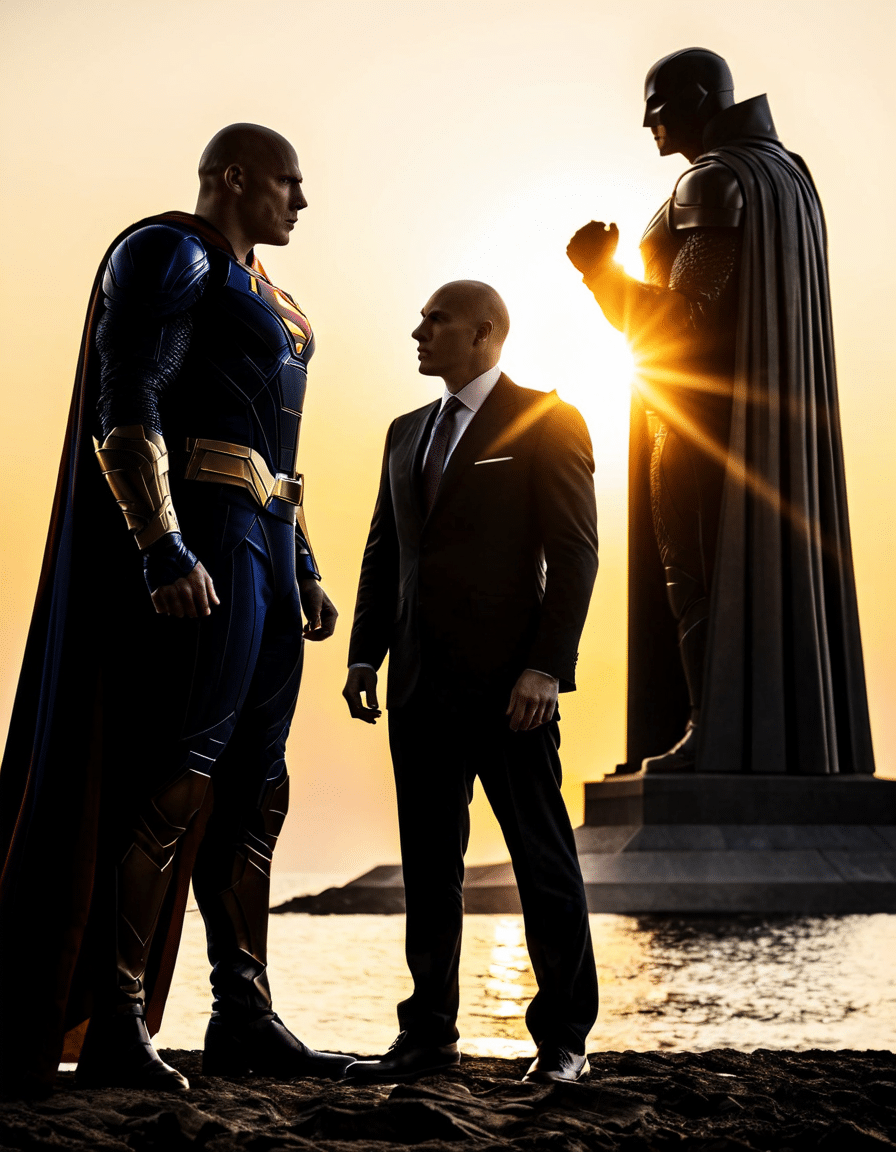
Lex Luthor The Genius Behind Superman’s Greatest Foe
Lex Luthor stands tall as one of superhero comics’ most compelling villains, a character who embodies the fears and ambitions of a world grappling with power dynamics. Since appearing in Action Comics #23 back in 1940, Lex Luthor has transformed from a mad scientist into a deeply complex figure whose intellect and moral ambiguity challenge both Superman and the readers. Whether you’re a filmmaker crafting a story around heroes and villains or a die-hard comic fan, understanding Lex Luthor offers insights into what makes a great antagonist, and why he remains so captivating even today.

1. The Origins of Lex Luthor: An Examination of the Character’s Early Days
Lex Luthor first hit the scene during a time when America was struggling to regain its footing post-World War II. Created by the dynamic duo of Jerry Siegel and Joe Shuster, Luthor was initially portrayed as an evil genius bent on world domination. But as the decades rolled on, a fascinating evolution took place. Lex became more than just a simple villain; he morphed into a symbol of the fears surrounding unchecked authority and the ethical dilemmas of power.
In the 1950s and ‘60s, Luthor’s character began to mirror the complexities of society. The Cold War era infused new life into his role; readers viewed him through the lens of anxieties surrounding science, technology, and a perceived loss of human control. He sparked a conversation about the implications of advancement that rings just as true today. Lex Luthor became a figure who asked us to consider: Who is truly more dangerous—the man with the power to save, or the man who believes he can do better without such power?

2. Top 5 Ways Lex Luthor Stands Out in the Superman Franchise
Lex Luthor is more than just Superman’s arch-nemesis. He’s a fascinating character that sets himself apart in several crucial ways:
1. Intellectual Supremacy
Luthor isn’t about smashing things; he’s about outsmarting. Unlike many villains who rely on raw strength, Lex Luthor uses his genius-level intellect as the cornerstone of his strategy. His mastery in fields like genetics and engineering allows him to devise detailed plans that give Superman a run for his money, proving that brains can outsmart brawn.
2. Complex Morality
Lex Luthor embodies moral ambiguity. He often sees himself as a misunderstood savior rather than a villain. In his eyes, Superman’s interference undermines humanity’s potential. This multi-layered morality has allowed Luthor to be depicted in various forms—from misguided protector to ruthless tyrant, which keeps audiences questioning what it means to be a “hero.”
3. Charismatic Leadership
As the CEO of LexCorp, Luthor possesses a magnetic charm that attracts followers. His ability to inspire loyalty, even while conspiring against Superman, highlights the complicated nature of ambition. He represents how personal desires often cloud ethical judgment in corporate culture—something many folks can relate to.
4. Technological Innovation
Luthor is a tech savant always looking to create something new. From his enhanced Lexosuit to sophisticated AI systems, his inventions symbolize the heights of human ingenuity. The battle between technology and Superman showcases the struggle between nature and human innovation, amplifying the stakes in their confrontations.
5. Cultural Impact and Adaptation
Lex Luthor hasn’t just lived on page and screen; he has evolved alongside society. From his chilling portrayal in “Smallville” to the action-packed “Batman v Superman: Dawn of Justice,” each version reflects the current societal fears—from corporate greed to governmental control. He’s a cultural chameleon who remains relevant because he embodies fears we continue to face.
3. The Psychological Profile of Lex Luthor: A Deeper Analysis
To understand Lex Luthor, we must delve into his mind. At his core, Luthor is driven by envy and ambition. Childhood experiences filled with trauma shape his perception of heroes and power dynamics. For instance, the storyline “Superman: Red Son” challenges traditional views, depicting Luthor’s complexities even more deeply.
Moreover, the character’s psychological profile can be seen in the HBO series “Superman & Lois,” which explores anxiety, jealousy, and the perennial shadow of Superman over Luthor’s life. This exploration not only adds depth to Luthor’s character but also calls into question what drives any villain. Is it purely malice, or is it based on human experience?
4. Lex Luthor’s Relationship with Superman: A Duality of Power
The relationship between Lex Luthor and Superman goes beyond typical hero-villain dynamics. At its core lies a mix of admiration and animosity. Lex sees Superman not as just a challenger but as a symbol of weakness in humanity. To him, a world reliant on an alien for help is a world that has surrendered its own strength.
Their confrontations symbolize a broader ideological clash: human ingenuity vs. extraterrestrial power. Each battle acts as a microcosm of a larger discussion about dependence in society, leaving audiences to ponder the implications of allowing someone—even a hero—to hold the reins of power.
5. Lex Luthor in 2026: Future Prospects and Interpretations
As we look toward 2026, Lex Luthor’s relevance doesn’t wane; it adapts. With the rise of political tensions and discussions around surveillance and corporate ethics, Luthor stands as a salient figure. He critiques the very structures of power he is often seen as embodying, making him an introspective lens through which to view societal issues.
Upcoming narratives in the DC Universe may explore artificial intelligence and corporate greed, themes that resonate strongly in today’s world. Viewers can anticipate a Lex Luthor who’s complex and layered, challenging societal norms and keeping the dialogue around power relevant for new generations.
Wrapping Up
Lex Luthor is more than just Superman’s enemy; he’s an enduring emblem of human strength, moral complexity, and the nuanced discussions around power. With his genius, layered morality, and cultural significance, he challenges us to confront fundamental questions about ambition and responsibility. As the entertainment landscape shifts, so does Luthor, ensuring his narrative remains impactful, reminding us that the lines between hero and villain can be intricately blurred. In understanding Lex Luthor, we not only explore villainy but also engage with core questions that continue to define the human experience—making his story one that resonates as strongly today as it did over 80 years ago.
For those intrigued by the wider narratives Luthor presents, diving deeper into characters like Jonny Harris or exploring the world of Hong Kong cinema through films that reflect similar themes can further enrich understanding. After all, exploring villainy opens up the vast tapestry of storytelling where every character stands to teach us something—sometimes even more than the heroes themselves.
Lex Luthor: The Genius Behind Superman’s Greatest Foe
The Birth of a Legend
Lex Luthor first emerged in Action Comics #23 back in 1940, and since then, he’s evolved into one of the most iconic villains in comic book history. Interestingly, Luthor’s character was actually inspired by legendary figures from history. Much like the infamous genius depicted in “Welcome Back, Carter Cast,” Luthor embodies both intelligence and ambition, traits that have led him to be portrayed by various actors throughout the years, like the brilliant Tenitra Michelle williams. His narrative reveals a villain who is as charismatic and complicated as any hero in the comic scene.
Luthor’s Many Faces
Over the decades, Lex Luthor has donned multiple personas, ranging from a corporate tycoon to a power-hungry ruler. This transformation showcases the character’s adaptability, much like how Kelli Finglass and the talented dancers adapt in their routines. Luthor’s genius lies not just in his intellectual prowess but also in his unyielding desire to outsmart Superman. With a personal vendetta fueled by a belief that humans should stand strong without the aid of superheroes, he’s often compared to figures in pop culture, such as the legendary Kung Lao, each embodying their own unique power.
Pop Culture Phenomena
Beyond comics, Lex Luthor has infiltrated various media, not unlike the way the charm of an Italian Delight captures the hearts of food enthusiasts. The character’s influence stretches from TV shows to movies, blending into popular culture and even diluting the lines between hero and villain. Did you know that in the animated series, Luthor is voiced by some of the biggest names in Hollywood? Meanwhile, you might ponder if Is Steve harvey alive? has a connection to this supervillain’s unique legacy—it’s all about the unexpected connections that fascinate us.
In conclusion, Lex Luthor isn’t just Superman’s adversary; he represents a deeper exploration of humanity’s potential for both good and evil. With Luthor’s storyline tapping into psychological themes and his battle against Superman reflecting society’s own struggles, it’s easy to see why this villain remains a cultural staple. Whether you’re catching up on Survivor Season 46 or grooving to a classic Honky Tonk vibe, don’t forget to appreciate the brilliant complexity that Lex Luthor brings to every aspect of storytelling.










